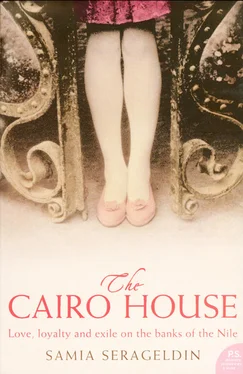The Cairo House
Love, loyalty and exile on the banks of the Nile
Samia Serageldin

For Kareem and Ramy
Cover Page
Title Page The Cairo House Love, loyalty and exile on the banks of the Nile Samia Serageldin
PART I PHOTOGRAPHS PART I PHOTOGRAPHS
1 The Feast of the Sacrifice
2 Sequestration
3 Past As Prologue
4 The Proposal
5 The Wedding
6 London
7 Cairo
8 Jedda
9 Papa
10 Madame Hélène
11 The Day of Remembrance
PART II EXILE
12 Paris
13 New Hampshire
PART III THE RETURN
14 Cairo Revisited
15 The Dervish
16 The Pasha
17 Tamer
18 Tarek
19 The Restaurant
20 Luxor
21 The Visit of Condolences
22 Insomnia
23 The House
24 The Accident
Glossary
P.S.
About the author
Seeing with Bifocal Vision
LIFE AT A GLANCE
A FEW FAVOURITE READS
A WRITING LIFE
About the book
The Alternative Universe of the Imagination
Read on
If You Loved This, You Might Like…
Find Out More
Acknowledgements
About the Author
Praise
Copyright
About the Publisher
PART I PHOTOGRAPHS
1 The Feast of the Sacrifice
For those who have more than one skin, there are places where the secret act of metamorphosis takes place, an imperceptible shading into a hint of a different gait, a softening or a crispening of an accent. For those whose past and present belong to different worlds, there are places and times that mark their passage from one to the other, a transitional limbo: like airports and airplanes.
Watch the travelers going through the arrival gates, being greeted by family and friends, or by strangers holding up a sign with their company name. Watch the subtle shift to accommodate a change in status or expectations, as we play our many roles in life: boss and child, parent and lover, hometown hot-shot and small fish in a big city pond. We emerge from the tunnel ramp and swing through the gates, a chrysalis bursting free of its cocoon, Superman erupting from the telephone booth; or we shuffle off to the luggage carousel, waiting to pick up the familiar battered luggage with which we left.
But the true chameleons are the ones who straddle two worlds, segueing smoothly from one to the other, adjusting language and body language, calibrating the range of emotions displayed, treading the tightrope of mannerisms and mores. If it is done well, it can look deceptively effortless, but it is never without cost. There is no hypocrisy involved, only the universal imperative underlying good manners: to do the appropriate thing, to make those around you comfortable. For the chameleon, it is a matter of survival.
‘Ladies and gentlemen, we will be landing at Cairo Airport in twenty minutes. Local time is 4 p.m., and the ground temperature is 22 degrees Celsius. Please fasten your seat belts and return seats and trays to their full upright position. We remind you to have your passports ready and your landing cards and customs declarations filled out.’
I stare at the landing card in front of me. ‘Purpose of visit: Business or pleasure?’ Simplistic questions in a complicated world. What is the purpose of my visit? How do you answer, I have come back to claim what’s mine? To find out if it is still mine. To find two children I left behind when I ran away a decade ago: one child is my son and the other the girl I once was. The future and the past. Between them they hold the key to the question I have come to try to resolve: where do I belong? Where is this chameleon’s natural habitat?
I fasten my seat belt and smile at the white-haired Minnesotan couple next to me as they grasp each other’s knuckled hands. We have made small talk about cross-country skiing and hockey. At some point they asked me where I was from, and I answered, truthfully, that I live in New Hampshire. It is not evasiveness, nor even the instinct to resist being pigeon-holed. It is only that any answer I give will be just as incomplete and misleading, so this is as good – or bad – as any other.
The wheels skim the ground and the engines are thrust into reverse with a violent roar as the plane hurtles down the runway, then skids to a stop. There is a round of clapping from the Egyptian passengers; it never fails, no matter how bumpy or smooth the landing. As much as a courtesy to the pilot, the applause is the self-congratulation of a fatalistic people on arriving safely. Hamdillah ‘alsalama. Home safely.
Cairo Airport, finally. I sling my shoulder bag and coat over my arm and head for the passport check booths. The Minnesotan couple follow me in line. I hand my blue American passport to the man at the first booth.
‘Do you have a visa?’ he asks in English.
‘No, but I’m Egyptian-born.’
He looks mildly surprised; perhaps I do not look typically Egyptian. He flips through my passport.
‘Seif-el-Islam?’ He raises his eyebrows at my maiden name and asks in Arabic, ‘Any relation to the Pasha?’
‘I’m his niece.’
The man enters the data from my passport on a computer screen, then hands the document back to me with a smile. ‘ Hamdillah ‘alsalama. Welcome home.’
As I pass through the gate I nod to the couple from Minneapolis, a little awkwardly, because I can see in their eyes that I no longer belong to their world. At customs I push my cart right through the Nothing To Declare aisle. I scan the mass of dark, eager faces beyond the barrier at the exit. One does not distinguish black or white, only infinite gradations of gray in this most ethnically-mixed and color-blind of peoples. Within a few hours I will no longer notice such things, just as I will no longer see the inevitable film of desert dust in the stark sunshine, like a layer of ash over the gray buildings and the sooty cars, the leaves of the trees and the dark winter clothing of the people.
The muezzin’s call from the minaret wakes me at dawn my first morning in Cairo. I listen to the drawn-out echoes rising and falling in the stillness. I try to go back to sleep but the layers of noise start to build up outside the wooden shutters: first the birds twittering, then dogs barking, voices raised in greeting; finally the first car will set off the incessant honking that punctuates every minute of the day on the streets of Cairo.
I can hear Ibrahim the doorkeeper carrying out his morning ablutions at the tap in the courtyard under my window. His wooden clogs clap on the cobblestones, then the creaky faucet is turned off. I can imagine him winding his turban around his shriveled old head. Someone passing by in the street calls out a greeting: ‘Morning of jasmines!’ Ibrahim responds: ‘Morning of cream to you!’ The flowery greetings make me smile. Such small automatic courtesies are some of the few luxuries which even the poorest of the poor can afford.
As a child I used to sleep right through all this. I even used to sleep through the Bayram Feast sacrifice. Except for that one year, that year that was to be the last of the ‘good old days’.
There is a photo of me and my parents taken in the salon of the villa just before the Feast of the Sacrifice that year, 1961. Papa is holding a cigarette in one hand, his other hand on my shoulder. He chain-smoked Craven A’s; I remember the red and white box with the black cat. In the photo he has the broad-shouldered, dark looks of the Latin film stars of the fifties. His moustache is very neat, and his hair is slicked back. That style of suit, double-breasted, with boxy shoulders, was in style then, but I remember him wearing it a decade later and still looking impeccably tailored in it. He was that rare sort of man who carries himself well, without a hint of vanity.
Читать дальше












